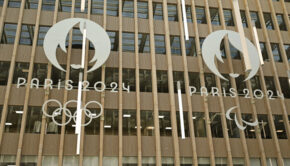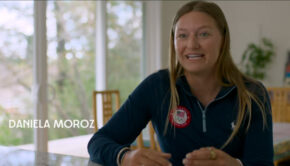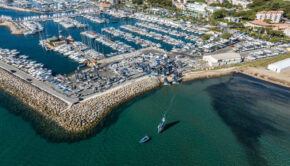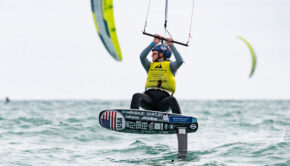Charlie McKee: Achievement Through Collaboration
Published on June 29th, 2016
Two-time U.S. Olympic medalist Charlie McKee is in his first quad as High Performance Director for the US team preparing for the 2016 Olympic Games. Scuttlebutt editor Craig Leweck spoke with Charlie about his Olympic background.
Let’s talk about your Olympic experience.
I was pretty young when I did a 470 campaign for the 1984 Games. That was when Steve Benjamin and Dave Ullman were sailing. We were the kids, they were the adults, it was a highly competitive era, and we saw how they campaigned and learned it. That was when Benj won the Silver medal.
For the 1988 Games I teamed up with John Shadden. He asked me to sail with him, and he had a pretty well-organized campaign laid out. We were two skippers, so I changed to crewing which I’d done a fair bit of when I was a kid.
That was really an amazing experiences. He was great to sail with, we had a very good campaign, and we won the Trials pretty easily. The 1988 Korea Games were a super windy event and we ended up winning a bronze medal. After that we both basically retired and started our careers. I was a commercial real estate appraiser for ten years.
But high-performance sailing was growing then so I dabbled in this and that, but certainly thought my Olympic experiences were over. But one of the life-changing experiences for me was being a coach on the US team at the 1992 Barcelona Games. I was a coach for the windsurfers – Mike Gebhardt and Lanee Butler.
From the team environment we had there with the athletes and the coaches, I saw how the sum could be more than the individual parts. There were people on the team who came together and helped each other, and Luther Carpenter, who is now our senior Olympic coach, was one of them. Luther had this belief that the coaches had things to add to help other sailors even if they weren’t experts in that class.
So for the 1992 Olympics, there was a little more collaboration or interaction, and that definitely was a team where people stepped up and performed really, really well. We had this Olympic environment experience, where teammates could gain energy from it and people would perform better.
When I heard Nathan Outteridge, who won the 49er Gold at the 2012 Olympics, describe the Australian team after those Games, it reminded me so much of that US team in Barcelona where individual success became not only contagious, but the energy was almost unstoppable. Each person’s success became something much bigger. For those of us that were there and experienced it, that helped formed our view of what you’re trying to create and trying to build as a team.
I feel like this is going to happen for the US team at the Rio Games. When we do spend time together people genuinely seem to like each other for the most part. It looks good.
But you ended up not being as retired from the Olympics as you thought.
I thought I was. I had a non-sailing job, I was a weekend warrior and had been sailing some in the 18-footer class. When Australian designer Julian Bethwaite came up with the idea to do a two person, one design, simplified version of 18s, my brother Jonathan and I happened to be racing in Australia.
We were asked by Peter Johnstone, who was thinking of getting involved in the boat, to take a look at the plan and offer our opinion. We soon ended up getting quite involved to the point that we actually sailed the prototype the first day in Sydney.
Then six months later, when they went into production, a bunch of west coast people put together a container to buy eight 49ers. So we weren’t doing Olympic sailing; we were just pushing our boats in the water for Thursday night racing, but doing it in 49ers, and we were hopeless. No one could tack or jibe or bear away or anything.
But we saw the boat’s potential, and started going to the Gorge and learning how to sail. It turns out everyone else in the world was struggling too, but our group together was sorting it out. So we put our boats in the container and shipped them off to the first Worlds in Perth. That was 1997, and while Chris Nicholson and Daniel Phillips (AUS) were way better than everyone else, Jonathan and I got second and Morgan Larson and Kevin Hall got third.
So we’re like, “Hey, we can kind of do this, and this is kind of fun.” We just sort of wandered into it, and now the 49er was going to be in the 2000 Games. After something like a year and a half, we realized that the level was going to get high and we were going to either go full in and quit our jobs and do the Games or step away.
So Jonathan and I decided to do it. We decided to quit and go all in. None of this was any part of a plan, whatsoever. But, anyway, the net result of all that was us sort of wondering back to Olympic sailing late in life. And the lure of being able to go sail with my brother and have a chance to go to the Olympics with him, that was pretty cool, and really cool to win the bronze medal.
You finally did call it quits.
Yeah, that led to us doing America’s Cup. The cool thing was that during our ramp up to the 2000 Games, our best friends Morgan and Kevin were campaigning with us, and we knew that it was likely one of us was going to win the Trials. So we sort of made this agreement that whichever one didn’t win, they’d help the other team carry on, and help them go through to the Games.
Well, part way through that, we heard about this shadowy sort of AC campaign being formed with a Seattle backer. And after the Games, all four of us ended up on this team getting jobs with One World.
Jonathan was quite an accomplished big boat sailor at this time, but the other three of us were not at all. I’ll never forget when we all showed up for the first meeting, and Peter Gilmour, who was the sailing director, asked, “What does everyone want to do?” Jonathan raised his hand to be the main trimmer, but Morgan and I figured that the tactician role was the only thing we were good at. Kevin is really good with math, so he said, “I think it would be kind of cool to learn to navigate.” That meeting set us all on a new and very different path.
However, what is important to say is that my Olympic experiences have had a very positive interactive and team oriented theme. This transitions well into the Cup environment to use time effectively and make good campaign decisions. For a lot of the young people within Olympic campaigns, that’s how they grow and learn and become better.









 We’ll keep your information safe.
We’ll keep your information safe.